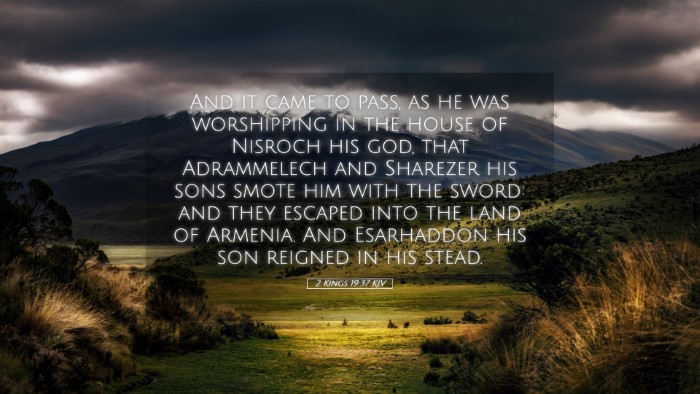Commentary on 2 Kings 19:37
Verse Text: "And it came to pass, as he was worshipping in the house of Nisroch his god, that Adrammelech and Sharezer his sons smote him with the sword; and they escaped into the land of Armenia. And Esarhaddon his son reigned in his stead."
Introduction
This passage from 2 Kings serves as a poignant conclusion to the account of King Sennacherib of Assyria, illustrating the divine providence that governs the affairs of nations and the ultimate futility of idolatry. The narrative captures the fate of Sennacherib as a powerful ruler who meets a violent end amidst the worship of false gods, thus emphasizing the consequences of turning away from the true God.
The Context of Sennacherib's Reign
The events leading to Sennacherib's assassination lay firmly within the historical backdrop of his ill-fated siege of Jerusalem. His hubris, as expressed in his taunts against the God of Judah, spoke volumes about his arrogance and presumption. The Lord's deliverance of Jerusalem against overwhelming odds illustrates a recurring theme throughout Scripture—the sovereignty of God over worldly powers.
Commentary Insights
Matthew Henry's Commentary
Henry highlights the irony of Sennacherib's demise occurring while he worshipped Nisroch, a god of Assyria. This act serves as a stark reminder of the folly of idolatry. As Henry observes, "The worship of false gods provides no refuge from judgment." His commentary delves into how Sennacherib's trust in his deities ultimately left him vulnerable to betrayal, showcasing that 'safety cannot be found outside of the true God.' The detailed circumstances of his attack by his own sons suggest a familial coup driven by contempt for their father’s misled allegiance.
Albert Barnes' Notes
Barnes expounds on the significance of the names "Adrammelech" and "Sharezer," noting that they may have been titles or actual deities worshipped in Assyria. Their act of violence serves as both familial betrayal and a reflection of the broader national turmoil stemming from Sennacherib’s arrogance. He comments on the broader implications of this event, indicating that “the overthrow of Sennacherib led to the eventual weakening of Assyria's power, marking a pivotal moment in the shifting geopolitics of the ancient Near East.” Barnes further articulates that “the transfer of power to Esarhaddon was not merely a change of rulers but a harbinger of Assyria’s declining fortunes.”
Adam Clarke's Commentary
Clarke draws attention to the significance of Sennacherib's idolatry as a precursor to his judgement. He notes that the assassination occurs in the temple of Nisroch, which symbolizes the depth of Sennacherib’s misplaced trust. Clarke states, “Idolatry, for all its promise of power, inevitably leads to destruction.” He illustrates how the Assyrian king’s failure to see the true power of Israel’s God results in his tragic fate. Additionally, Clarke elaborates on the international repercussions of this act, explaining how it mirrors the instability prevalent in terms of leadership transitions and political allegiances during this period.
Theological Themes
- The Sovereignty of God: The passage epitomizes God's unassailable authority over human affairs, as evidenced by the downfall of a potent king.
- The Consequences of Idolatry: Sennacherib's profile as an idolater leads to his demise, highlighting the biblical notion that false worship is ultimately destructive.
- Divine Judgment: Both the act of assassination and the context of Sennacherib's demise underscore the biblical principle of divine judgment against those who oppose God.
Applications for Today’s Believers
This passage serves as a sobering reminder for contemporary believers regarding the dangers of placing trust in anything other than the one, true God. The allure of modern idols—be they materialism, power, or even misguided ideologies—can lead to spiritual downfall. In a world often governed by similar principles of pride and rebellion against God, humility and worship of the true God remain essential.
Conclusion: The assassination of Sennacherib encapsulated in 2 Kings 19:37 is not merely a historical footnote but a potent reminder of the eternal truth that God retains ultimate control over history and the fate of those who would defy Him. The narrative encourages theologians, pastors, and students alike to reflect upon their allegiances and the gods they choose to serve. Just as Sennacherib’s worship led to his demise, so too can misplaced trust lead any believer astray.


